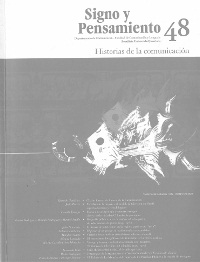Abstract
By exa mining a series of theoretical proposals as well as sorne actual work done in order to advance a history of communications, we attempt to identify different trends and perspectives in as far as they constitute theories, concepts, and methodological approaches that tackle communications as an object of analysis from a hi storical viewpoint. With this in mind, we look th rough sorne ofthe extant papers on the history of communications, particularly those which can he considered a direct legacy of either the French 'Annales School' or the British Marxist histori ans; we also hold a sort of cross-section perspective where different authors are examined as contributors to what we could call cultural history. Thus, the proposals cf authors, such as Raymond Williams, Peter Burke, Roger Chartier, and Armand Manerlart are here examined. Last but no least, we gather sorne traces that enable us to describe sorne basic features of the files known as history of communications. We stress the importance of reading a1l media as iterns which are an essential partof a 'cornmunications' regime', and the need to approach the use and appropriation of media as a facet that has to be incorporated into the history of communications. Thus, we assess the scope of our proposal and suggest sorne hints as to the future development of the field.This journal is registered under a Creative Commons Attribution 4.0 International Public License. Thus, this work may be reproduced, distributed, and publicly shared in digital format, as long as the names of the authors and Pontificia Universidad Javeriana are acknowledged. Others are allowed to quote, adapt, transform, auto-archive, republish, and create based on this material, for any purpose (even commercial ones), provided the authorship is duly acknowledged, a link to the original work is provided, and it is specified if changes have been made. Pontificia Universidad Javeriana does not hold the rights of published works and the authors are solely responsible for the contents of their works; they keep the moral, intellectual, privacy, and publicity rights.
Approving the intervention of the work (review, copy-editing, translation, layout) and the following outreach, are granted through an use license and not through an assignment of rights. This means the journal and Pontificia Universidad Javeriana cannot be held responsible for any ethical malpractice by the authors. As a consequence of the protection granted by the use license, the journal is not required to publish recantations or modify information already published, unless the errata stems from the editorial management process. Publishing contents in this journal does not generate royalties for contributors.


